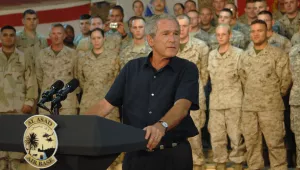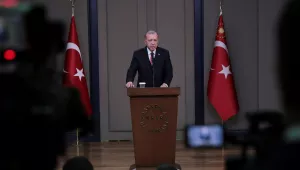A decade after the removal of Saddam Hussein, we still appear reluctant to embrace one of the central lessons of Iraq: that regime change necessitates nation building. This lesson—and the many subsidiary lessons that flow from it—is of real relevance to what is happening in the Arab world today. In Libya, the international community sought to distance itself from this reality and the consequences of doing so are becoming apparent. In Syria, the almost obsessive focus on Assad suggests that few policymakers are prepared to talk about the huge effort—by Syrians and the international community—that will need to follow Assad’s fall, instead preferring to focus on the comparatively limited goal of removing him.
The Bush administration went into both Iraq and Afghanistan largely on the grounds of protecting and advancing other national security interests, with little expectation these efforts would involve a decade-plus of nation building. While the intention was to replace Saddam Hussein and the Taliban with more representative and even democratic regimes, in neither case was this the primary reason for going to war, nor did the US government anticipate spending large amounts of time or resources to this end.
In Iraq, initial assumptions focused on the well-developed bureaucracies of the Iraqi state and the expectation that Iraq’s institutions would largely stay intact, ready for use by a more friendly, benevolent set of new rulers. While fewer institutions seemed to exist in Afghanistan, policymakers counted on the loya jirga (assembly) to legitimate the assumption of power by a new government.
Although not anticipated by those planning to remove Hussein, the intense focus on nation building following the removal of a longstanding dictator is, in retrospect, not surprising. As the Iraq experience has made so clear, the institutions of a repressive regime are unlikely to stay in place and function semi-normally once the regime is decapitated. The institutions of dictatorial states are not the same as those of modern nation-states; they may well not survive their patrons. In Iraq, Hussein had spent nearly thirty years hollowing out the institutions of the Iraqi state and refashioning them for the sole purpose of protecting and perpetuating his rule. When he fled Baghdad, these institutions quickly collapsed. Iraqis took to the streets and to their workplaces looking to pillage state buildings, over which they felt no ownership; because no law was believed to be larger than Hussein’s regime, with his departure, the country lapsed into lawlessness almost overnight.
Moreover, even in other situations where institutions outlive the downfall of a brutal regime, their survival may not be welcome or necessarily constructive. Very few peoples who endure a repressive regime are going to be content to adopt the security and other structures of the old state, even after the strongman has been deposed. For instance, the most vocal advocates for the “disbanding” of the Iraqi army were the Kurds, who had suffered genocidal acts at its hands. Expecting them to accept Hussein’s old army as the army of a new Iraq was a fantasy. And so, for similar reasons, is the hope of some outside powers that Syrians will retain the army and other institutions custom-built by the Assad dynasty after decades of oppression and an especially vicious rear-guard civil war over the last two years. In the rare instance, Egypt, where security institutions outlived the ruler, their strength and dominance led many Egyptians to lament that their revolution turned into a coup.
The real lessons from Iraq are not about how the institutions of the old regime should be maintained, but pertain to how and how not to take such institutions apart. Perhaps the most important lesson is that the old institutions, particularly in the security domain, should not be dismantled without anything to take their place. The greatest problem surrounding the disbanding of the Iraqi army was not simply alienating tens of thousands of highly trained Sunnis, many of whom later became sympathetic to the insurgency. Rather, it was upending the security order without offering any other workable arrangements in its place. Plans to build a new Iraqi army were slow and, at least initially, ill conceived. And yet the US-led coalition was at first unwilling to provide the security needed in the interim while a new Iraqi force grew in capability. In part, it was this vacuum that invited sectarianism and its militarization—and led to a vicious sectarian war in 2006.
If some dismantling of the state—either as part of the regime-change process or its aftermath—is inevitable, then nation building must necessarily follow. True, there is nothing that automatically requires that new institutions are democratic. But Iraq’s experience demonstrates the very strong pressures that will exist in that direction, even if one sets aside normative preferences for democracy. First, after decades of repression, people will desire accountability in their next government, perhaps above all else. Second, in all likelihood, these new societies will need to cope with significant societal divisions—either evident or newly “discovered” after years of such differences being suppressed. There is, in fact, no better form of governance for both promoting accountability and balancing power in highly divided societies than democracy. Finally, as in the example of Iraq, people will press for early elections, not out of ideology or even necessarily a love of democracy, but out of a need to determine who has the credibility to lead the country through a transitional process.
Another clear lesson from Iraq is that security is the basis on which all other forms of progress—political, economic, diplomatic—rest. Part of the reason for the failed US strategy from 2003 to 2006 was that the Bush administration pursued a strategy predicated on the idea that political achievements would drive security gains. While this may be true at certain levels of development, in situations of dramatic physical insecurity, violence reinforces the power of sect, ethnic group, and tribe over the broader ideas of nation and state, which otherwise might motivate the founders of any new or reborn country. The Bush administration’s revision of its core strategic assumptions to focus on security as a precursor to effective politics, rather than vice versa, underpinned the adoption of the “surge” strategy—which contributed to dramatic improvements in Iraq beginning in 2007.
In sum, one of the clearest overall lessons coming out of Iraq is that one should never think that regime change is a discrete task—that declaring victory can follow the simple removal of a horrific leader. By whatever means that leader goes, the hard work of both dealing with the institutions of the old regime and remaking the institutions of the new state must follow. The challenge, as Iraq has made abundantly clear, is that while some institutions must be dismantled, the new ones that take their place cannot be created overnight. This transition creates a period of extreme vulnerability, when spoilers can exploit vacuums. Some countries will be able to weather this period on their own, but others will require extensive external help to bridge the gap from regime change to peace and prosperity.
O'Sullivan, Meghan. “Lessons Learned: The Iraq Invasion.” World Affairs, May/June 2013





